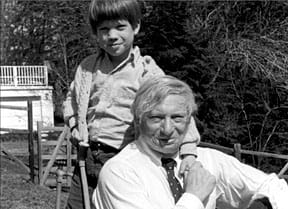When Louis Kahn collapsed and died in the men's washroom of Penn Station, he left a trail of mystery in his wake. Deemed one of the greatest living architects of the Twentieth Century, his body remained unidentified for more than two full days and he was hundreds of thousands of dollars in debt. But these were hardly the most astounding facts about him.
Kahn, it turned out, had fathered two illegitimate children with two separate women and had spent a good deal of his life shuffling between his two secret families. So cloak and dagger was he about his life in fact that many of his colleagues were surprised to discover that he was even married at all.
Nathaniel Khan, the architect's illegitimate son, was 11 years old when his father died, and his poignant documentary, My Architect, attempts through interviews and examinations of his father's work to capture the elusive nature of a person who by all accounts was an incredible artist but a difficult man.
The film is one-part biography, one-part survey of his work and one-part personal quest, but in all cases the picture that emerges is that of a man who although a mensch was a workaholic taskmaster whose peripatetic lifestyle kept almost everyone at bay. Kahn spends a considerable amount of time interviewing a host of celebrated architectural geniuses, all of who speak movingly of his influence on the form. He also speaks to cabdrivers, day workers and even the man who discovered his father's body in an attempt to create as rounded a picture as possible.
The film falters slightly only in those bits in which the filmmaker becomes the visual focal point. In these we lose the essence of the man because we're forced away from the subject and made to take in his emotional reactions. Nathaniel is strongest when he is visiting his father's masterpieces and grappling with his sense of his father as an artist. In this, the son becomes like the man: steady, controlled and unwaveringly beautiful. (Mongrel Media)
Kahn, it turned out, had fathered two illegitimate children with two separate women and had spent a good deal of his life shuffling between his two secret families. So cloak and dagger was he about his life in fact that many of his colleagues were surprised to discover that he was even married at all.
Nathaniel Khan, the architect's illegitimate son, was 11 years old when his father died, and his poignant documentary, My Architect, attempts through interviews and examinations of his father's work to capture the elusive nature of a person who by all accounts was an incredible artist but a difficult man.
The film is one-part biography, one-part survey of his work and one-part personal quest, but in all cases the picture that emerges is that of a man who although a mensch was a workaholic taskmaster whose peripatetic lifestyle kept almost everyone at bay. Kahn spends a considerable amount of time interviewing a host of celebrated architectural geniuses, all of who speak movingly of his influence on the form. He also speaks to cabdrivers, day workers and even the man who discovered his father's body in an attempt to create as rounded a picture as possible.
The film falters slightly only in those bits in which the filmmaker becomes the visual focal point. In these we lose the essence of the man because we're forced away from the subject and made to take in his emotional reactions. Nathaniel is strongest when he is visiting his father's masterpieces and grappling with his sense of his father as an artist. In this, the son becomes like the man: steady, controlled and unwaveringly beautiful. (Mongrel Media)
